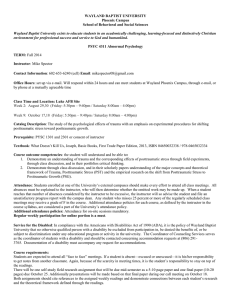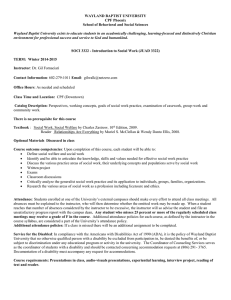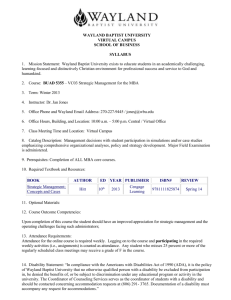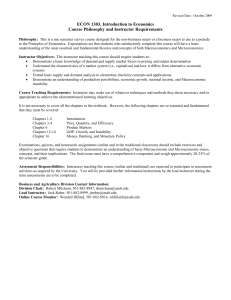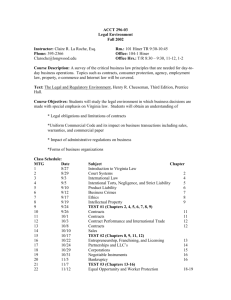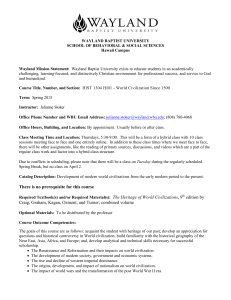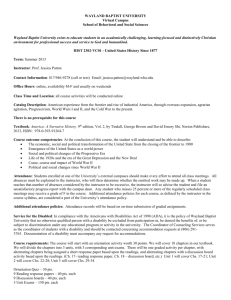School of Behavioral and Social Sciences Syllabus
advertisement
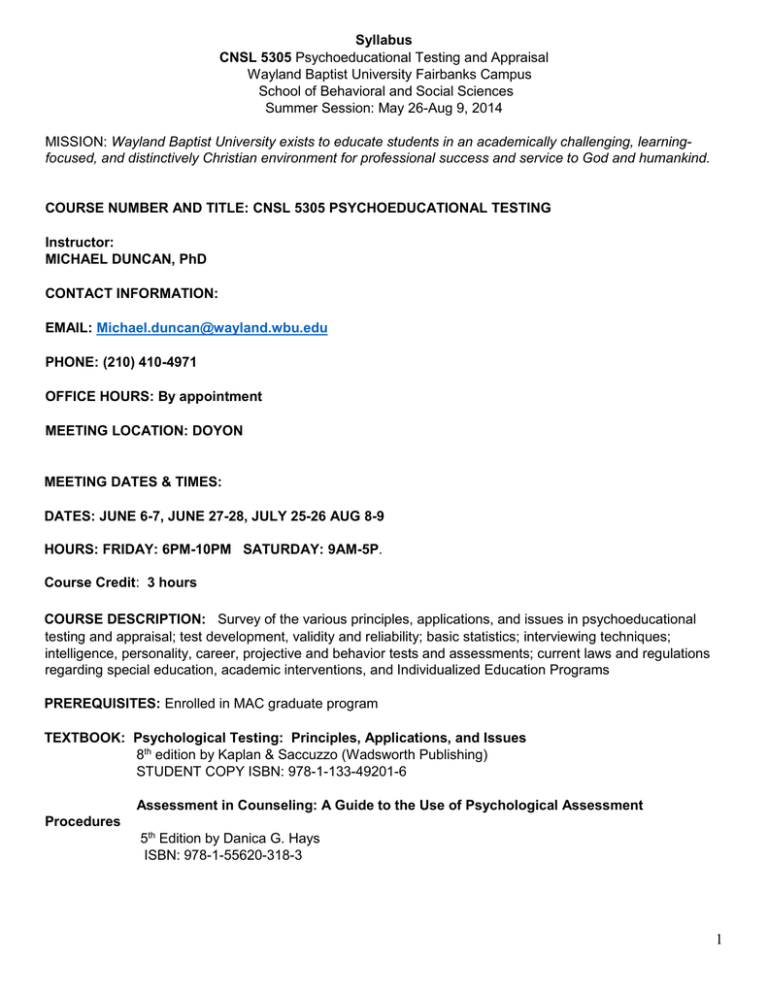
Syllabus CNSL 5305 Psychoeducational Testing and Appraisal Wayland Baptist University Fairbanks Campus School of Behavioral and Social Sciences Summer Session: May 26-Aug 9, 2014 MISSION: Wayland Baptist University exists to educate students in an academically challenging, learningfocused, and distinctively Christian environment for professional success and service to God and humankind. COURSE NUMBER AND TITLE: CNSL 5305 PSYCHOEDUCATIONAL TESTING Instructor: MICHAEL DUNCAN, PhD CONTACT INFORMATION: EMAIL: Michael.duncan@wayland.wbu.edu PHONE: (210) 410-4971 OFFICE HOURS: By appointment MEETING LOCATION: DOYON MEETING DATES & TIMES: DATES: JUNE 6-7, JUNE 27-28, JULY 25-26 AUG 8-9 HOURS: FRIDAY: 6PM-10PM SATURDAY: 9AM-5P. Course Credit: 3 hours COURSE DESCRIPTION: Survey of the various principles, applications, and issues in psychoeducational testing and appraisal; test development, validity and reliability; basic statistics; interviewing techniques; intelligence, personality, career, projective and behavior tests and assessments; current laws and regulations regarding special education, academic interventions, and Individualized Education Programs PREREQUISITES: Enrolled in MAC graduate program TEXTBOOK: Psychological Testing: Principles, Applications, and Issues 8th edition by Kaplan & Saccuzzo (Wadsworth Publishing) STUDENT COPY ISBN: 978-1-133-49201-6 Assessment in Counseling: A Guide to the Use of Psychological Assessment Procedures 5th Edition by Danica G. Hays ISBN: 978-1-55620-318-3 1 Textbooks are an information source and a means of explaining and stimulating interest in the material. It does not contain all the information students need to know, however. Additional information, interpretations, and analyses may be given in class. + COURSE OBJECTIVES: By the conclusion of the course, successful students will be able to: 1. Know major psychological tests and assessments. 2. Know the various aspects of test development including basic statistical concepts and reliability and validity. 3. Have a basic understanding of the major types of psychological tests and assessments including personality, intelligence, and career testing. 4. Learn effective means of interpreting, integrating, and communicating assessment information, both orally and in written reports, to other professionals and parents. 5. Be familiar with relevant psychological testing issues such as bias, tests and the law, and the future of testing. 6. Learn basic tips on test administration and interviewing as well as scoring and interpretation. Attendance and Absences Campus Attendance Policy: Students enrolled at one of the University’s external campuses should make every effort to attend all class meetings. All absences must be explained to the instructor, who will then determine whether the omitted work may be made up. When a student reaches that number of absences considered by the instructor to be excessive, the instructor will so advise the student and file an unsatisfactory progress report with the campus dean. Any student who misses 25 percent or more of the regularly scheduled class meetings will receive a grade of F in the course. Additional attendance policies for each course, as defined by the instructor in the course syllabus are considered a part of the University’s attendance policy (WBU Catalog, 2005-2006, p. 77). Instructors Additional Attendance Policies: Attendance is very important to the outcome of your success in this class. If you are unable to attend a class, it is your responsibility to notify the instructor immediately and to acquire the notes from another student for the class missed. Attendance will be taken and will be factored into students' grade. If you miss class, you should notify the instructor (preferably via e-mail) of your status and reason for missing class. Notice to Students Experiencing Disabilities: In compliance with the Americans with Disabilities Act of 1990 (ADA), it is the policy of Wayland Baptist University that no otherwise qualified person with a disability be excluded from participation in, be denied the benefits of, or be subject to discrimination under any educational program or activity in the university. The Coordinator of Counseling Services serves as the coordinator of students with a disability and should be contacted concerning accommodation requests at (806) 291- 3765. Documentation of a disability must accompany any request for accommodations. Academic Honesty Wayland Baptist University’s policy on academic honesty and/or plagiarism will be strictly adhered to in this class. Any plagiarized work will be referred to the Dean and may result in an automatic No Pass grade. Please refer to the Academic Catalog for further information. Reading: Students will be expected to read the assigned readings prior to the day they are discussed in class. Attendance & Participation: Students will be expected to be present and to participate and contribute thoughtfully to the classroom discussions. This requires you to be prepared for class by completing the reading prior to the day it is discussed in class. You are expected to be attentive and to respect your classmates’ opinions 2 Ethical and Professional Conduct. Counselors-in-training are expected to behave in accordance with the ACA Ethical Standards and other standards of accepted professional conduct, including attire appropriate to professional counseling. Special attention is called to standards of confidentiality. Specific Ethical and Professional Guidelines for School Counselors are also included in the (a) TEA Code of Ethics and (b) American School Counselor Association Ethical Standards. Grading The following grading system will be used throughout the course: A 100-90% B 89-80% C 79-70% D 69-60% F below 60% I incomplete* W withdrawal *An incomplete may be given within the last two weeks of a long term or within the last two days of a microterm to a student who is passing, but has not completed a term paper, examination, or other required work for reasons beyond the student’s control. A grade of “incomplete” is changed if the work required is completed prior to the last day of the next long (10 to 15 weeks) term, unless the instructor designates an earlier date for completion. If the work is not completed by the appropriate date, the I is converted to an F. Evaluation of student performance: PAPERS: Each of your three assigned papers will count for 20% of your grade. Your each presentation will count for 10 % of your grade. Participation will count for 10% of your final grade. Listed below are the details and the grade breakdown of the assignments: Paper # 1: Write a 3-5 page paper explaining /discussing the information in chapters 1-7. Provide to your reader a clear and concise understanding of the topics. Prove to your reader that your have a clear understanding of the information covered in the chapter and relate how these concepts relate to psychological testing. Presentation #1: Conduct a 10-15 minute presentation to the class discussing Chapters 1-7. Be prepared to field questions from the instructor and students. Prove to your classmates and instructor that you have a good understanding of the psychological testing concepts. Paper # 2: Write a 4-6 page paper explaining/discussing the information you have read in Chapters 8-18. Provide your reader a clear and concise understanding of the topics. Prove to your reader that you have a clear understanding of the information covered in each chapter and relate how these concepts relate to psychological testing. Presentation # 2: Conduct a 15-20 minute presentation to the class discussing Chapters 8-18. Be prepared to field questions from your fellow classmates and instructor. Prove to your classmates and instructor that you have a clear understanding of the topics covered in chapters 8-18. Paper # 3: Write a 2-3 Pager paper explain/discussing the information you have read in Chapters 19-21. Convince your reader that you have a clear understanding of test bias, legal implications 3 associated with testing and ethical considerations. Conclude your paper with a discussion of the future of psychological testing. Presentation # 3: Conduct a 10-15 presentation to the class discussing Chapters 19-21. Show to your class your understanding of the hazards of test bias, how testing and the law relate and discuss ethical considerations associate with psychological testing. Conclude with a discussion on the future of psychological testing. Be prepare to answer questions from student and your instructor. Also, be prepared to process with your class mates an ethical testing dilemma posed by your instructor. Date & Time JUNE 6-7 Content Introduction of the Course/ Overview of the Syllabus Read: Chapters 1- 7. Be prepared to discuss chapters 1-7. JUNE 27-28 Read: Chapters 8-18 DUE: Paper # 1----- Conduct Presentation # 1. Be prepared to discuss Chapters 8-18. JULY 25-26 READ: Chapters 19-21 DUE: Paper # 2------------Conduct Presentation # 2. Be prepared to discuss Chapters 19-21. AUG 8-9 DUE: Paper # 3-----------Conduct Presentation # 3. Professor reserves the right to modify syllabus as needed. Please consult catalog for important deadlines such as add/drop, withdrawal, etc. 4

